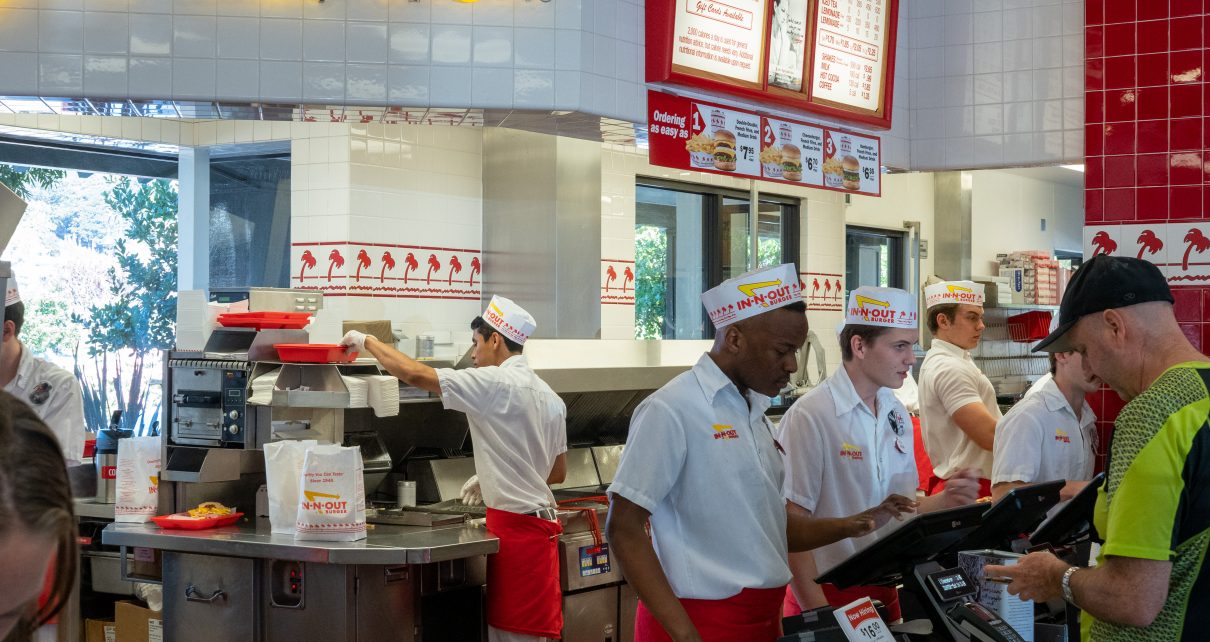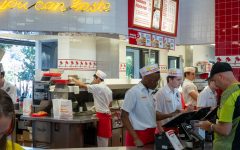
Mill Valley, CA: Workers at In-N-Out location behind counter take orders. (Photo: David Tran Photo, Shutterstock)
Secretary Of State Announces Fast Food Regulation Initiative Qualifies for Ballot
Enough signatures were collected to place AB 257 on November 2024 ballot
By Evan Symon, January 25, 2023 12:17 pm
Secretary of State Shirley Weber announced on Tuesday that a referendum will be held in November 2024 against AB 257, also known as the FAST Act, a law that was passed last year to create new labor union style of council to set minimum health, safety and employment standards across the California fast food industry, but had been held up by both legal action and proposition proponents.
The fight over Assembly Bill 257, authored by Assemblyman Chris Holden (D-Pasadena), began in February when Holden initially introduced the bill. Over the next several months, proponents and opponents of the bill fought in the Assembly and Senate over it. The bill, also known as the FAST Act, was subsequently pared down, eventually settling on creating a Fast Food Council of 10 members comprised of worker’s delegates, employer’s representatives and state officials that would set minimum wages, working conditions, and set hours for fast food employees in the state.
Proponents, such as labor unions, zeroed in on the notion that wages could rise to as high as $22 an hour under the law, while many restaurant and franchise groups greatly opposed AB 257, noting that restaurants would be hit unfairly hard by the bill, with many being more likely to close due to the industry still recovering from the COVID-19 pandemic and recent economic troubles. Increased prices due to supply chain delays and an industry-wide worker shortage were also held up as big issues that were left unresolved by the bill being passed.
Despite this, AB 257 passed the legislature in late August, with Governor Gavin Newsom signing the bill into law in early September. However, the victory was short lived, as a coalition of restaurants, formed Save Local Restaurants, and immediately filed for a referendum over the bill. While bill proponents initially dismissed the referendum effort as nothing more than restaurants angry over the bill being passed, job losses and higher costs in fast food restaurants became an effect of the bill and quickly changed voters minds in the last several months.
While signatures were being collected, the California Department of Industrial Relations said in late December that they would continue to implement the bill into law in 2023 until it was known if the signature gathering succeeded. As a result, the Sacramento Superior Court ruled on December 30th that the fast food worker law would be put on hold until the results were known. If unsuccessful, the law would then continue to go into place, including the Fast Food Council being set up. If successful, the law would continue to be put on hold until the proposition vote in November 2024.
According to the Secretary of State’s office, the group needed to get around 623,000 signatures by December 5th in order to make the November 2024 ballot and put a temporary halt on the bill while the matter is settled at the ballot box. Save Local Restaurants announced that day that over a million signatures had been collected, with the Secretary of State’s Office noting that it would take until mid-to-late January to count and certify them for the ballot.
Proposition over FAST Act heading to 2024 ballot
Results were finally released on Tuesday, with the Secretary of State’s Office announcing that enough signatures had been collected and that it will be a proposition on the November 2024 ballot. Save Local Restaurants and others in favor of the proposition quickly praised the announcement on Tuesday and Wednesday, noting that the law would have otherwise pushed costs higher for consumers and put thousands of jobs at risk across the state.
“California voters have made clear that they want a say on whether they must shoulder the burden of higher prices and job losses caused by the FAST Act,” said Save Local Restaurants in a statement. “This legislation singles out the quick service restaurant industry by establishing an unelected council to control labor policy, which would cause a sharp increase in food costs and push many Californians, particularly in disenfranchised communities, to the breaking point. During the highest inflation in more than four decades, consumers want to know that the restaurant meals they need in their busy lives will continue to be affordable, and that the jobs their communities rely on will still be there. Before they lose the brands that they love, voters will get the chance to have their say.”
U.S. Chamber of Commerce Senior Vice President of Employment Policy Glenn Spencer added, “Employers, workers, and consumers can take heart that the FAST Act has been put on hold permanently through November 2024. Had this ruinous policy gone into effect, not only would food prices rise and jobs be lost, but big labor would already be exporting it to other states and industries. In 2024, California’s voters will have the opportunity to put a stake into this law and save local restaurants.”
Conversely, those who wanted the signature gathering to fail and the FAST Act to go immediately into place, called the new initiative on Tuesday a setback for the people of California.
“This is something so many workers needed, and now, because of some angry restaurant owners, we’re going to have to wait a few years before workers get the protections they deserve,” explained Alicia Teasdale, who represents several fast food workers in San Bernardino and Riverside Counties, to the Globe on Wednesday. “The law that was passed was more than fair, and it is sad to see that we have to wait almost two years to see this through. We’re confident voters will agree with us, but until then, workers still won’t have a fair shake out there.”
The as of yet numbered proposition is to be on the November 2024 general election ballot, with the election itself expected to have high turnout due to elections for the U.S. Presidency, a Senate seat for California, and other major offices to be decided on by voters.
- San Francisco Cruise Robotaxi Folds Following $10 Billion In Losses - December 11, 2024
- New Information Shows UnitedHealthcare CEO’s Assassin Has California Ties - December 10, 2024
- Boeing To Cut 536 Jobs From California Following Several Years Of Major Incidents, Losses - December 10, 2024





Restaurants especially chains are headed to automation with computer terminals to replace counter employees and waiters. Government interference in business operations is what will lead to this.